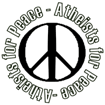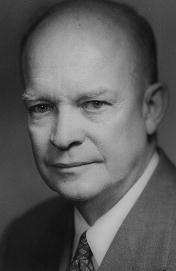|
|||||||||||||||||
Dwight D. Eisenhower
|
|
| Dwight D. Eisenhower was the 34th President of the
United States. He became famous serving as General in World
War two. He was a five star General and Supreme Commander of
the Normandy, France Invasion on D-Day, June 6, 1944. He was a
religious man, a Presbyterian, who spoke openly of God in his
political speeches. As a President Dwight Eisenhower sought to
decrease military spending and worked towards his vision of
promoting global peace. This is a complicated issue though, because
Eisenhower did speak highly of the peace process and warned against
heavy use of the military, but his foreign policy also created
tensions and set the precedent for the use of US influence to
install puppet dictators in foreign countries. Dwight
Eisenhower was a very popular president, and maintained a middle of
the road approach to policy. Dwight Eisenhower did support integration of blacks and whites in Little Rock, Arkansas with the full support of the Federal Government and the military, but he also opposed much civil rights legislation. He did speak of equality between all races, yet he also did not work to promote that equality at times when the opportunity was presented. He did speak in favor of the policy of "separate but equal" treatment of races in the United States in institutions such as the U.S. Military. Dwight Eisenhower was President during the infamous McCarthy era of the early 1950s. Eisenhower is highly criticized for not speaking out against Senator McCarthy until such time that McCarthy began to attack his friend General George Marshall. Eisenhower did not approve of Senator McCarthy, or the House of Un-American Activities Committee, but he also kept publicly silent on their actions for the most part. Eisenhower was a man that definitely professed a need for world peace and spoke often of it. However his foreign policy decisions ultimately worked against the prospect of peace in many ways and have been shown to be very divisive and manipulative. Of course his intent was to use covert and small scale tactics to maintain peace through secret negotiations with foreign leaders. His policy is a case of presumably good intentions, at least in regard to world peace, but poor execution. He made abundant of use of the CIA and special ops forces to overthrow governments and install "U.S. friendly" leaders, formed strategic anti-communist alliances, engaged the U.S.S.R. in an arms race in an attempt, which ultimately succeeded, to run the Russian economy into the ground by forcing them to spend a large part of their resources on weapons to keep up with American production, and installed the puppet government in Vietnam that ultimately lead to Vietnamese civil war in an attempt for the Vietnamese to dispose of the puppet dictators that the U.S. had put into place, which pulled the U.S. into the Vietnam War. He did quickly negotiate a cease fire treaty in the Korean War upon becoming president. He also was successful in negotiating a treaty in 1955 for Austrian sovereignty. Eisenhower also promoted the peace process in Egypt when Egypt, backed by the Soviet Union, was invaded by Israel, France, and England. Eisenhower refused to enter the conflict, and peace was quickly brought about, however some blame this lack of military action for further Soviet involvement in the Middle East after the incident. Eisenhower has been blamed by not acting with enough military might and also with acting with too much. One thing is certain though, his presidency set the stage for modern American foreign policy as well as domestic perception. As a president he brought religion into the political mainstream at a higher level, set the stage for the use of covert foreign and domestic tactics, defined the role of the use of the U.S. military as international peace keepers, often through covert tactics and deceptive politics that were never truly reflected at home in America, and he set the stage for the Cold War. He did not like the Cold War and tried to scale it back, but it seemed that all his attempts had the opposite effect of their intent. There is, and always has been, debate about how much influence Eisenhower actually had over American foreign policy during his presidency. Some suggest that the policy was not his doing and that he simply played the role of negotiator, something he was very good at, in making the policy work, but that he himself was not the man that developed the policy. Upon leaving office Dwight Eisenhower warned America to be wary of the growing power of the Pentagon and the growing "military-industrial complex". Eisenhower may indeed be the most complicated American president to try and understand. His presidency marked a very distinct turning point in American history, both domestically and in matters of foreign policy, not all of which was under the control of America or certainly Eisenhower. Much of what he said in speeches, and in his personal actions, seemed to contradict the policy decisions that were made under his presidency, which has caused many people to question just how much influence he actually had as a president. Yet the more that is learned about his presidency the more it seems that he was in control. Eisenhower himself is a seemingly simple man, yet upon closer inspection he is reveled to be a complex and highly intelligent man, who was extremely good at public relations. His presidency is no different, and leaves a lot of questions below the surface. Here are a few more quotes from Eisenhower: "If men can develop weapons that are so terrifying as to make the thought of global war include almost a sentence for suicide, you would think that man's intelligence and his comprehension...would include also his ability to find a peaceful solution."President Dwight D. Eisenhower, Press Conference, Washington, DC, 14 November 1956 "The United States strongly seeks a lasting agreement for
the discontinuance of nuclear weapons tests. We believe that this
would be an important step toward reduction of international
tensions and would open the way to further agreement on substantial
measures of disarmament." "Controlled, universal disarmament is the imperative of our
time. The demand for it by the hundreds of millions whose chief
concern is the long future of themselves and their children will, I
hope, become so universal and so insistent that no man, no
government anywhere, can withstand it." "If the United Nations once admits that international disputes can be settled by using force, then we will have destroyed the foundation of the organization and our best hope of establishing a world order." Dwight D. Eisenhower "Whatever America hopes to bring to pass in the world must first come to pass in the heart of America." Dwight D. Eisenhower "I hate war as only a soldier who has lived it can, only as one who has seen its brutality, its stupidity." Dwight D. Eisenhower "Don't join the book burners. Don't think you are going to conceal faults by concealing evidence that they ever existed." Dwight D. Eisenhower, June 1953, Dartmouth College "I like to believe that people in the long run are going to do more to promote peace than our governments. Indeed, I think that people want peace so much that one of these days governments had better get out of their way and let them have it." Dwight D. Eisenhower "One of my major regrets is that as we left the White House I had to admit to little success in making progress in global disarmament or in reducing the bitterness of the East-West struggle. . . . But though, in this, I suffered my greatest disappointment, it has not destroyed my faith that in the next generation, the next century, the next millennium these things will come to pass." Dwight D. Eisenhower |
| http://www.spartacus.schoolnet.co.uk/USAeisenhower.htm
http://www.americanpresident.org/KoTrain/Courses/DE/DE_In_Brief.htm |


